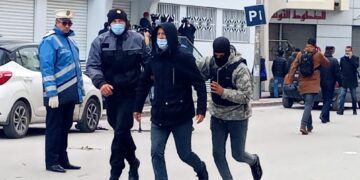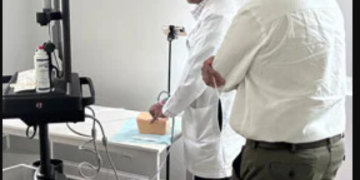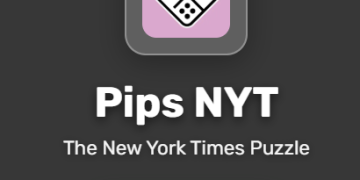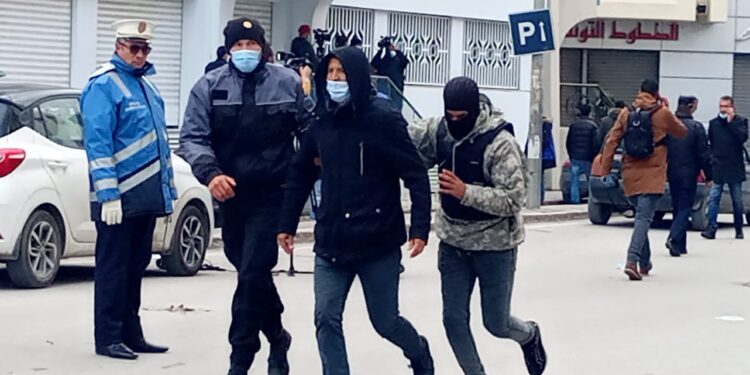Analyst Maurizio Gero filed this piece from Tunisia where he saw protests live and took the following photo.
The 11th year after the Tunisian Revolution that sparked the Arab Spring started with a failed demonstration. On the 14th of January, the anniversary of the ousting of Ben Ali, few hundred people from different parties but mostly Ennahda, without flags or any symbol that could distinguish them, tried to protest against the President defying the ban imposed on demonstrations because of Covid. Heavy police dispersed the people, arrested few and the small demonstration were “nip in the bud” as a local newspaper said. Some are saying that Tunisia is a risk of dictatorship, but this event showed that we are far from the demonstration of hundreds of thousands of people that you would expect if Tunisian population felt that President was responsible of a “coup” against their democratic will. The fact is that the current Tunisian transition towards democracy and development entered in a slow-moving chronic crisis, after 11 years since it started.
The President recently launched online consultations on different topics from economic to social, health and cultural affairs. The goal is a new constitutional draft that will substitute the Constitution of 2014, to be approved with the referendum on July 25, one year after President Saied suspended the Parliament, closed the government and created a new technocratic government made of non-party people, who some people called a “coup” and others a liberation. Following the referendum new elections will be held on December 17, the new anniversary of Tunisian revolution (Saied wanted to remember not the ousting of Ben Ali but the self-immolation of Mohamed Bouazizi, to show the importance of population need more than the cast and elite power struggle).
A constitution written just by an elite of technocrats surrounding the Presidency, even if with online consultation, has not the same legitimacy and support of a constitution draft by a Constitutional Assembly that has not been elected in Tunisia. So, the political crisis is there. The G7 nations plus the EU called recently for a swift return to functioning democratic institutions with an elected parliament. But the situation is not so that clear or simple. Tunisian democratization is the only one that worked after the Arab Spring, which became everywhere, apart in Tunisia, an “Arab Winter”, and is one of the only two democracies in the Arab World together with Lebanon. Tunisians are proud of this democratic transition and want to keep it. That is why they trusted the President to retake in the hand the transition that went out of the right track. Kais Saied, a former constitutional professor, not a general like Al Sisi as some complaining about his move compared to, had to take some strong decision because of several political, social and economic reasons.
At political level the corruption and inefficiency were unbearable. When you have political gridlock and a lack of governance the unfitness of the political class is evident. Protests went on for months last year because of the economic disaster produced by failed governments, in a stalemate that could not even produce new laws and give to people the services needed and, on the contrary, had often fistfights in the Parliament. Since the Constitution of 2014 the politicians elected were not able to create even a Constitutional Court, to defend that Constitution, showing their lack of vision and lack of deeply understanding what to defend a democracy require. And, actually, the Constitution of 2014 is an advanced one, in particular in the preamble and the human rights clauses (that will remain the same the President said) with even a target parity between men and women in elected bodies (Tunisian women are the only Arab women that are equal to men by law).
Corruption and impunity were rampant too. The 2019 elections are also suspect of corruption, such that 19 people were recently charged with electoral crimes, including Ghannouchi from Ennahda and former president Marzouki. Also, few days ago Noureddine Bhiri, a former justice minister and deputy president of Ennahda, has been arrested under charges of “illegal issuance of passports for some individuals and for a serious suspicion of terrorism”. Saied’s opponents have accused of politicized charges and even fear of a slide back to authoritarianism, but these moves seems related with corruption and impunity more than authoritarianism. Actually, what are the parties doing in this time of waiting for a new Constitution and elections? Are they trying to solve their internal problems, first of all inefficiency and corruption, that made people protest for months before Saied took the decision to close down everything? No, they are using the time just to protest. Protest is important but is not enough.
They need to form cadres, militants and candidates, facilitate new internal institution building, making dialogue with civil society associations in order to understand what policies are needed by the people, and make internal open and transparent reflections to show the population that they learned the lessons from mistakes, proposing detailed programs in the next elections instead of just slogans. They also need new dialogues to prepare some form of shared government in a country that have more than 20 parties represented in the Parliament and so will need to have for sure some coalition government. Actually, the electoral law will have to put some high threshold, at least 5% or even 10 as in Turkey, if they want to avoid the ungovernability caused by coalition governments with a myriad of parties.
Also, a good proposal for a sustainable democratization process could be some form of institutional decentralization. Since 2011 Tunisia started to decentralize to local regions and cities but much more can be done with investments in this process by all actors, including foreign countries like Italy is doing for example. Actually, the proposal of the President is a “hourglass” system in which neighborhood-level local councils would be elected and from them regional and national representatives would be drawn by lottery. This would allow for representation and legitimacy and hopefully for a more efficient and less corrupted government.
At economic level Tunisia is also in a chronic crisis, facing increasing poverty and regional inequalities. The GDP collapsed 8.6 percent in 2020, the budget deficit widened to 10 % of the GDP, and the country’s public debt reached 87% percent of the GDP at the end of 2020. The percentage of poverty increased from 14 to 21 percent and the unemployment rate increased from 15 to18 percent between 2020 and 2021. Tunisia is also strangled by the weight of its external debt, equal to 30 billion dollars. To get out of the crisis it is necessary to boost economic growth and development quickly otherwise the disaster will be inevitable. A clear indicator of this is the increased attempt of migrate from Tunisian citizens. According to The Global Initiative Against Organized Crime, between 2020 and mid-2021, migration from and through Tunisia rose to levels not seen since the months following the 2011 revolution. Tunisian security and defence forces intercepted 35 thousand irregular migrants in the country’s littoral areas and off its shores, and Italian authorities recorded the disembarkation of 28 thousand Tunisians. There is an urgent need to address Tunisia’s economic weakness if the country wants to come out of this crisis. The risk is that the IMF funds that the President is requesting for a rescue package could bring an excessive austerity that could make things even worst.
Democracy is not something we conquer. As the US president Biden remembered to Americans when was elected democracy is a long process, that has to be constantly nurtured otherwise dies. Actually we could say for democracy what Benjamin Franklin said for Republic more than two centuries ago when supposedly asked if America chose Monarchy or Republic: “ A Republic if you can keep it.” We will see in this 2022 if Tunisia will keep its democracy. If Saied will be able to be the visionary leader that wants to be, if the parties will rise to the occasion and if the civil society will keep trusting the democratic path until new Constitution and new elections will be done by the end of the year. Otherwise the Arab Spring will be really complete its failure in becoming an Arab Winter everywhere, even in the country that started it.




























































